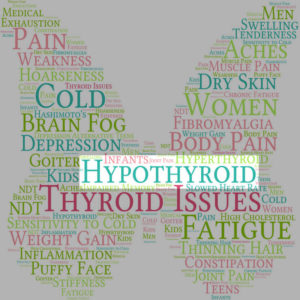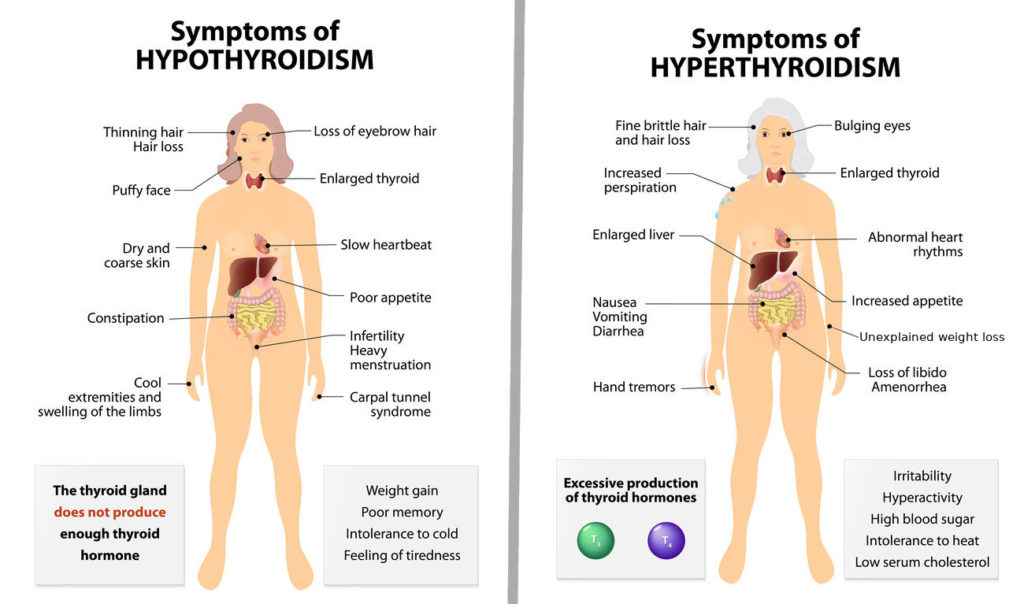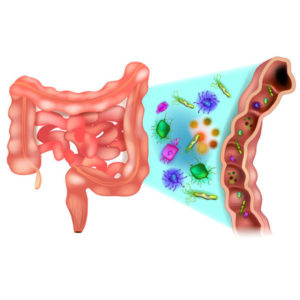Symptoms of Hashimoto’s Flare Up

-
Contents:
- What is a Hashimoto’s Flare Up?
- Hypothyroidism Vs. Hyperthyroidism
- Hashimoto’s Treatment
- The Importance of Getting the Right Labs
- Nutrient Deficiencies
- Foods to Avoid
- Hypothyroidism & Weight Loss
Hashimoto’s Disease is an autoimmune condition where the body attacks the thyroid gland. This gland secretes hormones that greatly influence several crucial body processes like metabolism, heart rate, digestive function, muscle control, mood and maintaining healthy bones. Hashimoto’s is generally associated with hypothyroidism, which is when there is too little T3/T4 available to the body. The proper balance of these hormones is crucial for health.
What is a Hashimoto’s Flare Up?
Symptoms of Hashimoto’s flare up involve a worsening of hypothyroidism symptoms like brain fog, fatigue, feeling cold, depression, irritability, weight gain, constipation, dry skin, puffy face, muscle weakness and hair loss. During a flare up, symptoms increase in intensity. While the autoimmune processes behind Hashimoto’s thyroiditis are not completely understood by medical science, there are several factors that influence the progression or resolution of the disease process. Flare ups of hypothyroidism can be brought on by acute or chronic stress, emotional trauma, physical injury, a sedentary lifestyle and inflammatory foods. Over-exertion from excessive physical activities, especially extended-time cardio like distance running, can deplete nutrients necessary for proper thyroid function and also exacerbate Hashimoto’s disease.

There are many underlying factors that contribute to autoimmune disease. For this reason, at Terrain Wellness we go way beyond simply prescribing a thyroid medication and moving on. We continue to work with our patients to resolve the underlying health conditions that contribute to hormone imbalance. Furthermore, we understand that many patients experience the unpleasant symptoms of hormone imbalance long before a prescription would be considered necessary based on the overly basic lab reports that are often the standard of care.
While treatment for Hashimoto’s does require a doctors’ supervision, there are some simple things that most people can do to improve their thyroid function. Be sure to talk with your doctor before making health, wellness and lifestyle changes. This article is not medical advice and is presented for entertainment purposes only.

Despite what the overly-simplistic primary-care medicine approach may imply, endocrine imbalances are quite complex. Complexity notwithstanding, these health problems are still simpler to resolve when we catch them early and begin treatment before a prescription is necessary. Our enhanced standard of medical care includes extensive lab testing for nutrient deficiency, estrogen dominance, excessive stress hormones like adrenaline and cortisol as well as screening for immune system cells that attack the thyroid. Our treatment goal goes beyond prescriptions in that we want our patients to regain a state of health where medications are no longer necessary. Even better, we strive to detect and remedy hormone imbalances before they get bad enough that a prescription is necessary.
Symptoms: Hypothyroidism Vs Hyperthyroidism
Excess T3/T4 results in hyperthyroidism while too little T3/T4 results in hypothyroidism. When hyperthyroidism reaches dangerous levels it can result in a thyroid storm, an emergency medical condition where heart rate, body temperature and blood pressure become so high that it becomes life threatening. While this article mainly deals with Hashimoto’s and hypothyroidism, it’s important to realize that there are other thyroid-harming autoimmune conditions like Graves’ Disease that result in hyperthyroidism. Below are some of the common symptoms of each condition.
- Low Energy, Fatigue
- Unusual Weight Gain, Difficulty Losing Weight
- Menopausal Symptoms
- Brain Fog, Confusion, Difficulty Concentrating
- Dry Skin
- Hair Loss: Dry, Brittle & Easily Damaged Hair
- Brittle, Weak Fingernails
- Slowed Heart Rate
- Menstrual Changes
- Irritability, Mood Swings
- Constipation, Slowed Digestion
- Sensitivity to Cold
- Low Mood, Depression
- Weak Muscles
Hypothyroidism:
- Excessive Sweating
- Feeling Overly Warm, Heat Intolerance
- Muscle Shakes, Fine Tremors
- Anxiety, Agitation, Feeling Nervous, Restlessness
- Rapid, Irregular Heartbeat, Racing Heart Rate
- Weight Loss
- Muscle Weakness
- Bulging Eyes
- Frequent Bowel Movements
- Over-Stimulation
Hyperthyroidism
Hashimoto’s Treatment
Hashimoto’s treatment involves much more than basic lab testing and hormone supplementation. While treatment does involve a physician’s supervision, there are still many things that patients can do to improve their hormone health by dismantling the health factors that are correlated with the progression of the autoimmune process. Choosing nourishing foods and eliminating processed foods that contribute to inflammation and unhealthy gut bacteria is often the right place to start. The old adage, ‘you are what you eat’ is especially true when it comes to maintaining hormone balance. Another thing that can help improve autoimmune hypothyroidism symptoms is weight loss, although care should be taken not to over-train, which depletes the body of important nutrients (see my article: how to lose weight with Hashimoto’s for details).
Cleaning up food choices is a great place to start, but it may not go far enough when an autoimmune disease is already occurring. Because of this, we may test for unhealthy gut bacteria that affect nutrient absorption and increase the inflammation linked to autoimmune processes and replete nutrient deficiencies with IV therapy or oral supplementation. Additionally, our treatments also include stress-reduction practices like NET (Neuro-Emotional Technique), that are useful for releasing the past emotional trauma that can exacerbate hormone imbalance and harm the immune system. Although many in the medical community may wish to treat these conditions from a strictly physical perspective, the link between emotional health, stress and autoimmune conditions is quite clear.
While treatment for Hashimoto’s does require a doctors’ supervision, there are some simple things that most people can do to improve their thyroid function. Be sure to talk with your doctor before making health, wellness and lifestyle changes. This article is not medical advice and is presented for entertainment purposes only.
Get Comprehensive Labs & Hormone Panels

The standard of care is to run a few basic tests and prescribe a medication like Synthroid or Armour-Thyroid once your Hashimoto’s Disease has progressed far enough. The problem is that hormonal imbalances are very complex and there are a number of underlying factors that may go undiagnosed. Furthermore, it’s a good idea to choose a doctor experienced in natural, functional medicine with the experience needed to interpret those lab results and translate them into a comprehensive healthcare management plan.
Hormones like cortisol (a stress hormone), insulin, estrogen and progesterone can influence one’s thyroid health. Sadly, these other important hormones are not usually tested on a normal thyroid panel. Healthcare providers also need to pay close attention to other factors like thyroid antibodies (autoimmune cells that attack the thyroid) and the delicate balance between TSH (Thyroid Stimulating Hormone) and active T3 thyroid hormone versus the inactive T4 form. There is also a link between inflammatory processes related to liver function and healthy T3/T4 levels.
Beware of Nutrient Deficiencies
There are a number of vitamins and minerals that are crucial to hormone health. Sadly, many of these nutrients may not be found in sufficient quantities in the Standard American Diet. More than that, junk foods high in processed carbohydrates and additives can actually lower the body’s ability to absorb proper nutrition even with supplementation.

Please keep in mind that we do not advise patients to begin taking vitamins and supplements without proper lab testing because sometimes it’s possible to have too much of a good thing. That said, let’s review a few of the nutrients that are important to thyroid health. Iron, magnesium, zinc and biotin (Vitamin B-7) are just a few of the nutrients that are necessary for proper endocrine balance. Another point that many are unaware of is the fact that the body needs fat and cholesterol to manufacture hormones. Because of this, some low fat and some vegan diets may lead to hormone imbalance due to lack of certain nutrients over time. For many, the basic guidelines of choosing natural, minimally processed foods with plenty of protein, vegetables and some balanced fats and cholesterol is a good place to start. In contrast, fast-burning carbs and ingredients common to processed foods can contribute to inflammatory processes and thyroid-harming nutritional deficiencies.
Further Reading: Nutrient Deficiencies
Foods to Avoid

Basically, I strongly suggest that patients rethink the “Standard American Diet” that is high in processed carbohydrates, artificial ingredients, sugar and sugar substitutes. There are many strong reasons for this, but for brevity’s sake I’ll just give you an overview of some of the more prominent ones.
Excess Carbs Feed Unhealthy Gut Bacteria
If you’ve ever eaten yogurt, then you’ve likely heard of probiotics. Probiotics are beneficial bacteria that live inside of our gut and help us to digest foods. However, not all bacteria are as beneficial. Medical research shows that each type of food is broken down by a different type of gut bacteria, and this is where things get problematic (PubMed: Gut Bacteria & Food Choices). The types of gut bacteria that break down processed foods like refined carbs, sugar and fried foods are tied to inflammation and autoimmune processes.
Because of this, junk food increases inflammatory response and reduces our ability to absorb proper nutrition by feeding unhealthy gut bacteria. Not to mention, junk food also causes thyroid-harming blood sugar spikes and is usually high in calories that we have to work extra to burn off.
Beware of Diet Foods
So, you want to eat healthy: be careful. When people try to “eat healthy”, they are bombarded with ads and products all claiming to be beneficial in one way or another. However, many of those foods use one or more beneficial properties to distract from the fact that they are still high in sugar, additives or other processed ingredients. As someone once said: “Organic Junk Food, is Still Junk Food.” Beware of ingredients like cane syrup, agave nectar and honey, because although these may be natural or organic, they are still refined carbs.
Also, be careful of yogurt, which is marketed as a health food despite the fact that most major labels add so much sugar that it has a glycemic index similar to ice cream and other desserts. If you do decide to eat yogurt for the probiotics, choose a plain yogurt with no sugar and add your own fruit if you want to dress it up.
The last major diet food to be careful of are the sugar substitutes. The promise of eating something sweet without the calories of sugar is certainly tempting, but new research has shown that there’s a catch. The catch is that sugar substitutes do such a good job of mimicking the sugar experience that they fool the body into thinking it really ate sugar. When you consume sugar substitutes, the body responds with an insulin spike, just like if you ate real sugar. These insulin spikes can be even worse because the body is trying to compensate for sugar that doesn’t exist, which causes a rebound effect where you end up with a hormone-damaging blood-sugar crash where you are more hungry and less healthy than before.
Hashimoto’s & Weight Loss

Losing weight with Hashimoto’s is difficult. This condition typically manifests itself through hypothyroidism. But, it can pay off by helping to reduce a flare up of symptoms. The problem is that hypothyroidism causes weight gain, and weight gain can also make hypothyroidism worse. This leads to a self-reinforcing cycle of Hashimoto’s symptoms like fatigue, weight gain, depression and muscle pain. None of which makes you feel like working out. However, taking small steps like choosing more nourishing foods, ditching the Standard American Diet and increasing our physical activity can all help to reduce the symptoms and severity of the autoimmune process. Start off slowly with low impact activities like walking, yoga, stretching or going for a short hike.
As your health improves over time and if your doctor approves, consider adding in resistance exercises that work the major muscle groups. Think of squats, dead lifts, planks and pushups. Be careful of over-training and use extended time cardio like distance running or cycling very sparingly, if at all. Extended-time cardio can deplete the body of many of the nutrients necessary for proper hormone balance.

In closing, I hope you found this discussion of the symptoms of hashimoto’s flare up informative and inspiring. The health tips discussed above will not take the place of individualized care from a doctor experienced in natural, functional medicine. It’s important to talk with your doctor before making fitness, dietary or other healthcare decisions. Thank you for reading. Have questions or comments? Join our community on Instagram and be part of the conversation.
Yours in health,

About the author:
I am an Oregon licensed primary care physician as well as a licensed acupuncturist. While my status as a Doctor does give me full prescriptive rights, I prefer to use more gentle, natural techniques when possible. I attended USC School of Dentistry for my undergraduate degree and the National University of Natural Medicine for my doctorate. My status as both a physician and an acupuncturist trained in classical Chinese medicine gives me a unique perspective on healthcare.






I need help with Hashimotos & Hypothyroidism but since my Dr moved, no Drs here listen/comprehend what I’m feeling & I feel worse the past few years. Don’t know what to do when they don’t do needed tests for both to help me get better.
Please call 503-847-9211 and book a 15 minute phone consult with us.